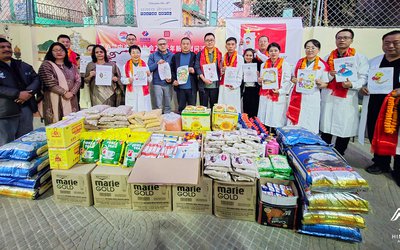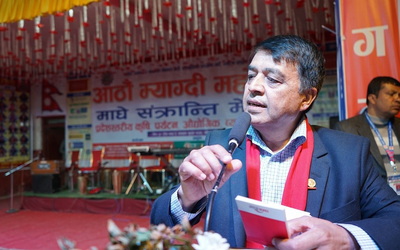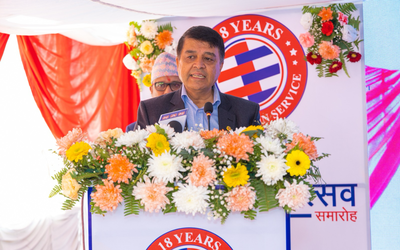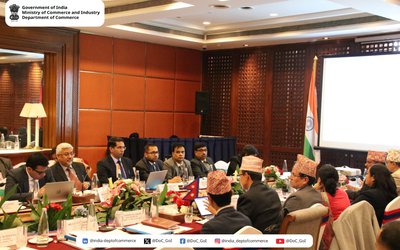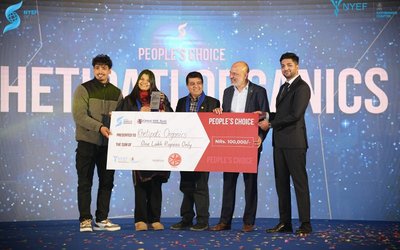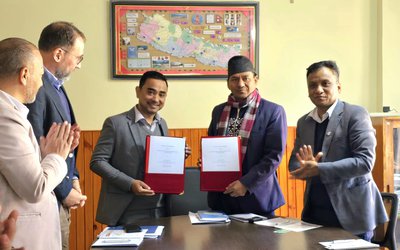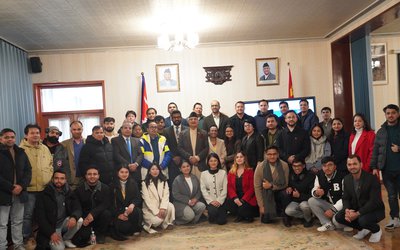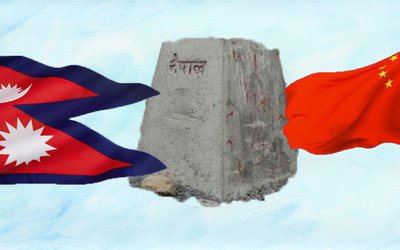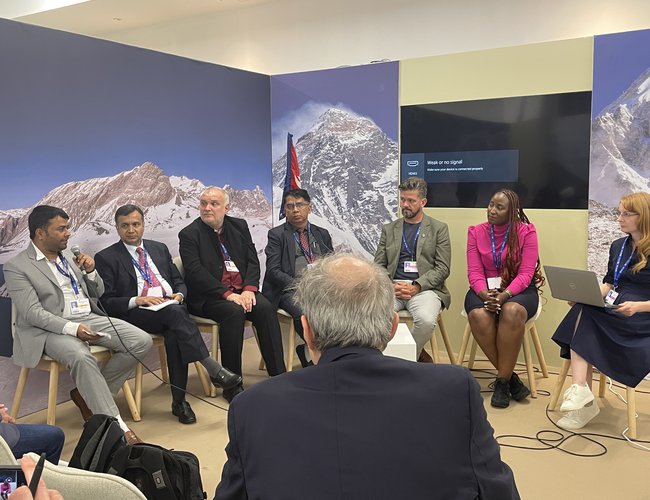
Modern Energy Cooking Services (MECS) and People, Environment & Energy Development (PEEDA) held aside event on December 5th at the Nepal Pavilion COP28 to highlight the opportunities and potential interventions to accelerate electric cooking scale up in Nepal and beyond. The event drew on findings from MECS, an eight-year programme funded by UK Aid (FCDO), and their global partners.
Over 30 representatives from key stakeholder groups, such as the global clean cooking and electricity sectors attended to hear talks from Nawa Raj Dhakal, the Executive Director of Alternative Energy Promotion Centre, Nepal (AEPC), Justine Akumu, Senior Energy Officer, Ministry of Energy and Mineral Development, Uganda, Professor Ed Brown, Director of MECS Program, and Richard Sieff (MECS). A lively panel discussion followed where the first three speakers were joined by Ben Jeffreys, CEO & CO-Founder of ATEC Global, and Biraj Gautam, CEO of People, Energy and Environment Development Association (PEEDA).
The talks and panel discussion emphasized the event’s central message that there are a range of practical evidence-based interventions with the potential to accelerate scaled eCooking transitions in Nepal and beyond.
A central theme was the scope for carbon finance to address affordability in terms of buying a new electric cooking appliance, including thescope for schemes which directly link incentive payments to the use of electric cooking stoves. ATEC are currently piloting one scheme in Bangladesh and Cambodia, which will see households receive 70% of the funds from carbon credits received from using an IoT enabled induction stove instead of their previous polluting traditional stoves
Praising Nepal’s track record of delivering clean cooking solutions such as the nationwide biogas programmes in the 1990s, ATEC CEO, Ben Jeffreys highlighted how the country’s abundant hydro resources provided the perfect energy setup for net zero electric cooking. To help accelerate this transition, Jeffreys called for Nepal to accelerate policy on Article 6 to tap into global carbon trading opportunities.
Akumu highlighted how in Uganda the utility had been a driving force behind electric cooking as they saw eCooking as key for generating income for the utility. To increase electric cooking, Akumu pointed put how the utility had supported a mass eCooking promotion, which has led to the introduction of ambitious policy targets, incentives for local manufacturing for eCooking appliances, and a new‘ e-Cooking tariff’. Naming the new tariff, the @e-Cooking Tariff’ was highly significant as it signaled the country's readiness for electric cooking – a hugely important promotional message for increasing consumer confidence.Going forward, UMEME were training utility engineers to repair electric cooking appliances to increase vitally needed after-sales services and exploring on-build financing.

Reflecting on Kenya’s experience, Kenyan energy consultant Michelle Akute emphasized the importance of electric cooking for the Kenyan utility, Kenya Power. The utility’s flagship program‘Pika na Power,’ cook with electricity,educates customers on how clean, efficient, and affordable electric cooking is.
Biraj Gautam (PEEDA) pointed out that there was an urgent need to raise awareness of the cost-saving benefits of electric cooking at scale and the need to develop local repair services and mass promotion activities to ensure these benefits are realized.
Prof Ed Brown (Loughborough University, UK) highlighted how the new Global Electric Cooking Coalition launched earlier at the Cop28 main stage could support interventions to scale up eCooking in Nepal through its collaboration platform of global and national eCooking advocates. The Professor Highlighted the clear opportunities for electric cooking in Nepal and welcomed Nepal to join GeCCo in working together to accelerate eCooking transitions.
Reflecting on these observations, Nawa Raj Dhakal (AEPC) and event chair Secretary Gopal Prasad Sigdel, Ministry of Energy, Water Resources and Irrigation, commended the launch of GeCCO and its aims to support national initiatives for the successful accomplishment of cooking energy transition towards electric cooking.
Secretary Sidgel noted how the session had highlighted opportunities for utilities to play a key role in supportingelectric cooking transitions through active promotions, favorable tariffs, upgrading household wiring and meters, and integrated planning of electrification and clean cooking, emphasizing these insights were“very useful for learning sharing among the countries who are driving the electric cooking as their national priority.” Closing the session, the Secretary called for organizations to support and work together with the government in meaningful and impactful collaboration to help Nepal achieve its electric cooking goals.
- BEEN: Ensuring Energy-Efficient Building Design To Reduce Carbon Emission
- Jan 26, 2025
- Nepali Embassy Celebrated Chinese New Year In Beijing
- Jan 26, 2025
- Nepal-China Joint Monitoring Of Border Areas
- Jan 26, 2025
- Zelenskyy claims Putin wants to 'manipulate' Trump
- Jan 26, 2025
- Weather Forecast: Cold Wave In Terai And Partly Cloudy To Mainly Fair In Pokhara And Kathmandu
- Jan 26, 2025
